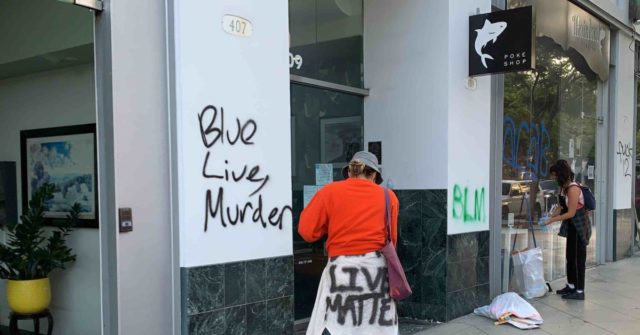The Los Angeles chapter of Black Lives Matter is suing the City of Santa Monica, which was smashed and looted during Black Lives Matter protests a year ago.
It's tempting to laugh at this sort of blue-on-blue lawsuit, which claims that a "progressive" city is in fact a repressive totalitarian regime bent on suppressing freedom of expression. It must hurt to be sued by the mob that Santa Monica's left-wing politicians have probably spent months praising to the hilt.
However, these cases are often designed to lead to ridiculous settlements in which the city gives the plaintiffs everything they want and the residents and taxpayers are basically powerless to stop either side. And Santa Monica is also a place I love. I was really, really upset about the riots last year. I still am.
Black Lives Matter claims that the police are responsible for the looting, because they focused on arresting peaceful protesters and interfering with their constitutional rights. That's not what happened. The unlawful protest drained police resources and provided cover for the looters and rioters literally one block away. The riots and looting happened because of Black Lives Matter.
This is not the first Black Lives Matter lawsuit, and it won't be the last, against a city they wounded and nearly destroyed. Perhaps a Democratic municipal leader will finally stand up to them. Perhaps dolphins will fly out of the ocean.
This week’s portion launches the great story of Abraham, who is told to leave everything of his life behind — except his immediate family — and to leave for “the Land that I shall show you.”
There’s something interesting in the fact that Abraham is told to leave his father’s house, as if breaking away from his father’s life — but his father, in fact, began the journey, moving from Ur to Haran (in last week’s portion). His father set a positive example — why should Abraham leave him?
Some obvious answers suggest themselves — adulthood, needing to make one’s own choices, his father not going far enough, etc.
But I think there is another answer. Abraham (known for the moment as Abram) needs to establish his own household. This is not just about making one’s own choice, but really about choosing one’s own starting point. It’s starting over.
Sometimes we start over in fundamental ways even if much that surrounds us remains the same. Sometimes the journey we have to ...
The story of Noah is familiar; the details, less so.
Noah is often seen as an ambivalent figure. He was righteous -- but only for his generation. What was his deficiency?
One answer suggests itself: knowing that the world was about to be flooded, he built an Ark for the animals and for his own family -- but did not try to save anyone else or to convince them to repent and change their ways (the prophet Jonah, later, would share that reluctance).
Abraham, later, would set himself apart by arguing with God -- with the Lord Himself! -- against the destruction of Sodom and Gomorrah, saying that they should be saved if there were enough righteous people to be found (there were not).
Still, Noah was good enough -- and sometimes, that really is sufficient to save the world. We don't need heroes every time -- just ordinary decency.
Hi all -- as I noted last month, I'm going to be closing down my Locals page, at least for tips and subscriptions -- I may keep the page up and the posts as well, but I'm no longer going to be accepting any kind of payment.
Look for cancelation in the very near future. Thank you for your support!













